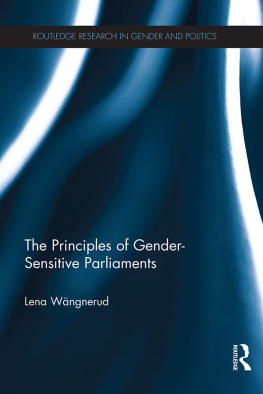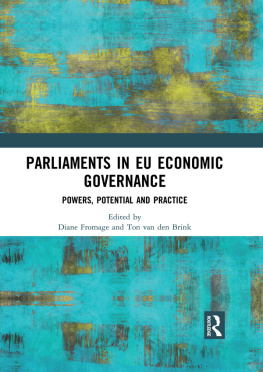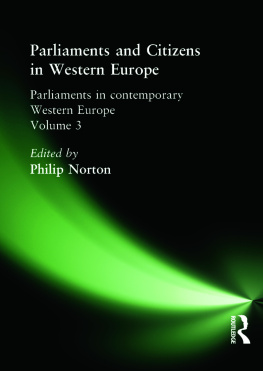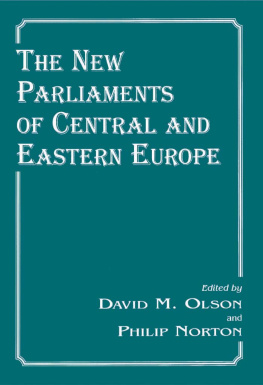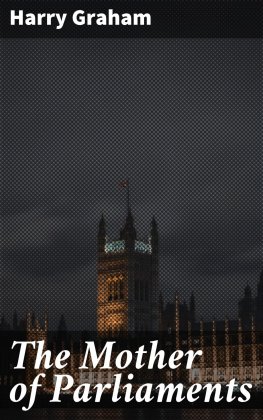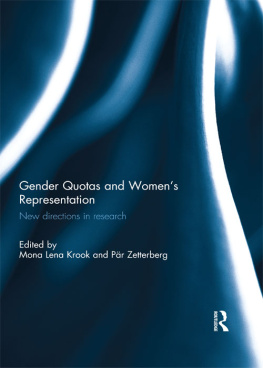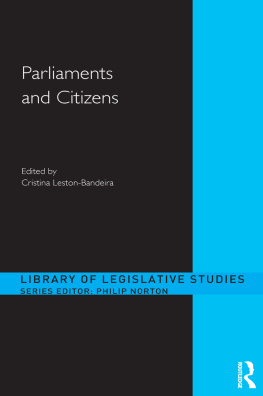Not just a book about sex, gender and the Swedish Parliament, Lena Wngnerud confronts the contemporaneous challenges of political representation, womens interests, masculinized political parties, and feminist institutionalism. A simple but nonetheless elegant argument is made: gender sensitive parliaments are constituted by gender sensitive parties, themselves made up of gender sensitive individuals. Marshalling extensive and persuasive data, Wnerud identifies the individuals (male and female), institutions (especially parties), and wider contexts conducive to a gender sensitive politics. Any gender equality effect of the presence of women in parliaments, including the Swedish one, is never simply about numbers. A politics of presence is not enough. Changes, she writes, do not just happen. Politics and gender scholars would do well, then, to apply her politics of feminist awareness approach so as to better understand the complicated relationship between womens descriptive and substantive representation.
Sarah Childs, University of Bristol
This excellent book turns the usual, unanswerable question, Do women make a difference in politics, into empirically answerable questions of the conditions for gender-sensitive parliaments.
Drude Dahlerup, Stockholm University, Sweden
The Principles of Gender-Sensitive Parliaments
Gender serves as a lens that makes visible important issues in the field of representation: Whom do elected politicians represent? What is at stake in the parliamentary process? What do we know about the interplay between parliaments and the everyday lives of citizens? It is widely understood that womens presence in government matters but we need to understand more clearly the conditions under which it matters.
Using Sweden as a case study, a country where the number of women elected to the national parliament has steadily risen since the 1970s, Lena Wngnerud presents a novel approach on which characteristics inside a parliament help to translate physical representation into substantive representation for women. Using three guiding principles, (i) the implementation of equal opportunities for women and men to influence internal parliamentary working procedures; (ii) the creation of room for womens interests and concerns on the political agenda; and (iii) the production of gender-sensitive legislation, Wngnerud shows what the necessary conditions are for womens needs, interests and concerns to be adequately integrated into parliamentary processes.
The Principles of Gender-Sensitive Parliaments adds fuel to all these classical debates within the field of political representation and will bring to the attention of a wider audience why electing women matters.
Lena Wngnerud is Professor at the University of Gothenburg. Her research focuses on representative democracy, gender and corruption, gender and anxiety. She has published in the Annual Review of Political Science, European Political Science Review, Politics & Gender, Governance, Party Politics, and Scandinavian Political Studies.
Routledge Research in Gender and Politics
1. The Womens Movement in Protest, Institutions and the Internet
Australia in transnational perspective
Sarah Maddison and Marian Sawer
2. The Politics of Gender Culture under State Socialism
An expropriated voice
Hana Havelkov and Libora OatesIndruchova
3. Maternal Transition
A NorthSouth politics of pregnancy and childbirth
Candace Johnson
4. The Principles of GenderSensitive Parliaments
Lena Wngnerud
The Principles of Gender-Sensitive Parliaments
Lena Wngnerud
First published 2015
by Routledge
711 Third Avenue, New York, NY 10017
and by Routledge
2 Park Square, Milton Park, Abingdon, Oxon OX14 4RN
Routledge is an imprint of the Taylor & Francis Group, an informa business
2015 Taylor & Francis
The right of Lena Wngnerud to be identified as author of this work has been asserted by her in accordance with sections 77 and 78 of the Copyright, Designs and Patents Act 1988.
All rights reserved. No part of this book may be reprinted or reproduced or utilised in any form or by any electronic, mechanical, or other means, now known or hereafter invented, including photocopying and recording, or in any information storage or retrieval system, without permission in writing from the publishers.
Trademark notice: Product or corporate names may be trademarks or registered trademarks, and are used only for identification and explanation without intent to infringe.
British Library Cataloguing in Publication Data
A catalogue record for this title has been requested
Library of Congress Cataloging in Publication Data
Wngnerud, Lena.
The principles of gendersensitive parliaments / Lena Wngnerud.
pages cm
Includes bibliographical references and index.
1. Women legislators. 2. Legislative bodies. I. Title.
HQ1236.W365 2015
328.082dc23
2014042146
ISBN: 9781138802650 (hbk)
ISBN: 9781315754086 (ebk)
| Cen | Center Party |
| CEO | chief executive officer |
| ChrDem | Christian Democratic Party |
| Con | Conservative Party |
| diff. | difference |
| EU | European Union |
| GDI | Gender-related Development Index |
| GDP | gross domestic product |
| GEM | Gender Empowerment Index |
| Grn | Green Party |
| Lft | Left Party |
| Lib | Liberal Party |
| Ln | natural logarithm |
| MP | member of parliament |
| n.a. | not applicable (party not represented in parliament) |
| NewDem | New Democracy Party |
| NGO | nongovernmental organization |
| OECD | Organisation for Economic Co-operation and Development |
| OLS | ordinary least squares |
| RNGS | Research Network on Gender, Politics and the State |
| SE | standard error |
| sig. | significance |
| SNES | Swedish National Elections Study Program |
| SocDem | Social Democratic Party |
| SweDem | Sweden Democrats |
| UN | United Nations |
I started work on this book when I was Visiting Research Scholar at the University of California, Berkeley, in 2009/10. I gained tremendously from attending the seminars, but most important, perhaps, were the frequent walks with a cup of coffee up to the top terrace. Standing there, I had a view over the Bay Area and the Golden Gate Bridge. This is the kind of environment that encourages big thoughts. Back at the University of Gothenburg I got stuck in to everyday life of academia giving lectures, doing administrative work, writing papers and articles instead of a book. One morning, however, I woke up determined that I should finish the book on which I had started work, and here it is.
When I finally picked up the manuscript I realized that I had learned a lot from all the work that seemed like bits and pieces and I would like thank all the people I have collaborated with in recent years: Stefan Dahlberg, Carl Dahlstrm, Monika Djerf-Pierre, Peter Esaiasson, Mikael Gilljam, Marcia Grimes, Sren Holmberg, Anna Hgmark, Bengt Johansson, Andrej Kokkonen, Staffan Kumlin, Elin Naurin, Henrik Ekengren Oscarsson, Maria Oskarson, Bo Rothstein, Helena Stensta, Anders Sundell, Aksel Sundstrm, Rickard Svensson, Marcus Samanni, and Patrik hberg. We have worked together on papers, articles, and book chapters and Im happy for all the good discussions! I know that Gothenburg is not Berkeley I miss the view from the top terrace but the research environment in Gothenburg is vibrant and, not least important, supportive. Big thoughts get criticized but always with the intention to make things better. A special thanks to Anna Hgmark, who helped me with the statistical analyses.


